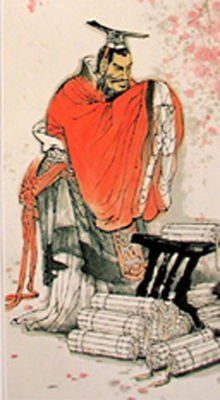Marquess Wen of Wei
| Marquess Wen of Wei | |||||||

Marquess Wen of Wei
|
|||||||
| Chinese | 魏文侯 | ||||||
|---|---|---|---|---|---|---|---|
|
|||||||
| Transcriptions | |
|---|---|
| Standard Mandarin | |
| Hanyu Pinyin | Wèi Wén Hóu |
Marquess Wen of Wei (Wèi Wén Hóu; died 396 BCE) was the first Marquess to rule the State of Wei during the Warring States period of Chinese history (475–220 BCE). Born Wei Si (魏斯), he belonged to the House of Wei, one of the noble houses that dominated Jin politics in the 5th and 6th centuries BC.
He became ruler of Wei in 445 BCE, succeeding Wei Huan-Zi, and in 424 BCE adopted the title of "Marquess" (Chinese: ; pinyin: Hóu). In 403 BCE King Weilie of Zhou acknowledged Wei Si as Marquess of Wei while conferring similar titles on the leaders of the former vassal states of Han and Zhao, thereby effectively splitting the State of Jin into three and confirming the Partition of Jin.
Sima Qian praised Marquess Wen of Wei for his eagerness to learn. The Marquess is said to have often consulted the Confucian scholar Zixia as well as Tian Zifang (Chinese: ) and Duangan Mu (Chinese: 段干木) among others. Marquess Wen of Wei also appointed Legalist philosopher Li Kui, whose principles for the implementation of political reforms were "to eat one must labor, to receive a salary one must provide meritorious service; those who do not will be punished." As the State of Wei underwent these reforms it became rich and powerful.
In turn, Marquess Wen defeated the State of Zhongshan while General Wu Qi attacked and took five cities in what would become Xihe Commandery (Chinese: ) within the borders of the State of Qin (between the Yellow River and Luo River spanning parts of modern-day Shaanxi and Shanxi Provinces). With Ximen Bao installed as magistrate of Ye (in modern-day Hebei Province), Běimén Kě (simplified Chinese: ; traditional Chinese: ) in control of Suanzao (simplified Chinese: 酸枣; traditional Chinese: 酸棗) and Zhai Huang (simplified Chinese: ; traditional Chinese: ) as Senior Minister, Wei underwent political reforms and constructed irrigation systems. As a result, Wei became a powerful country during the early Warring States Period.
...
Wikipedia
